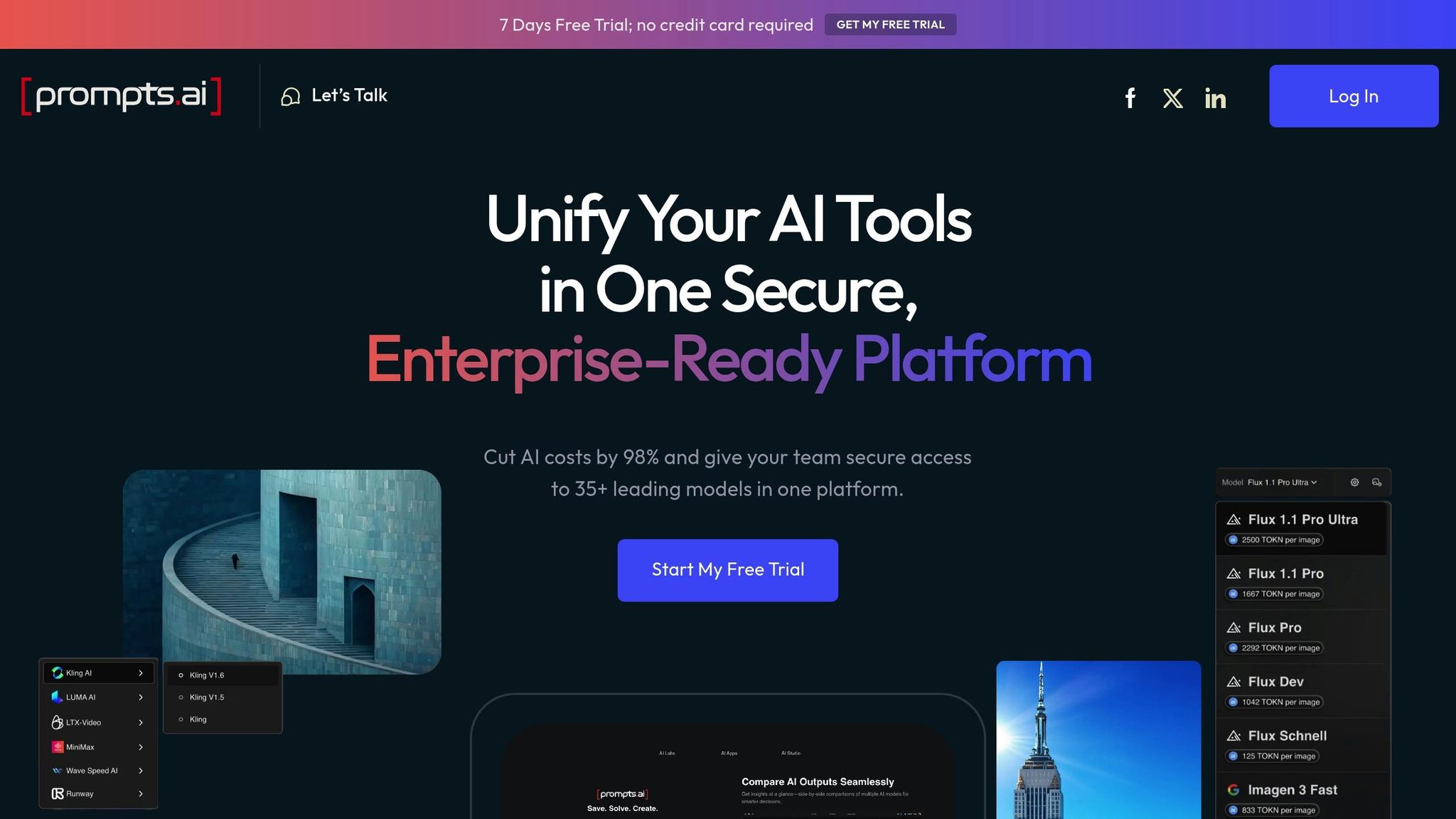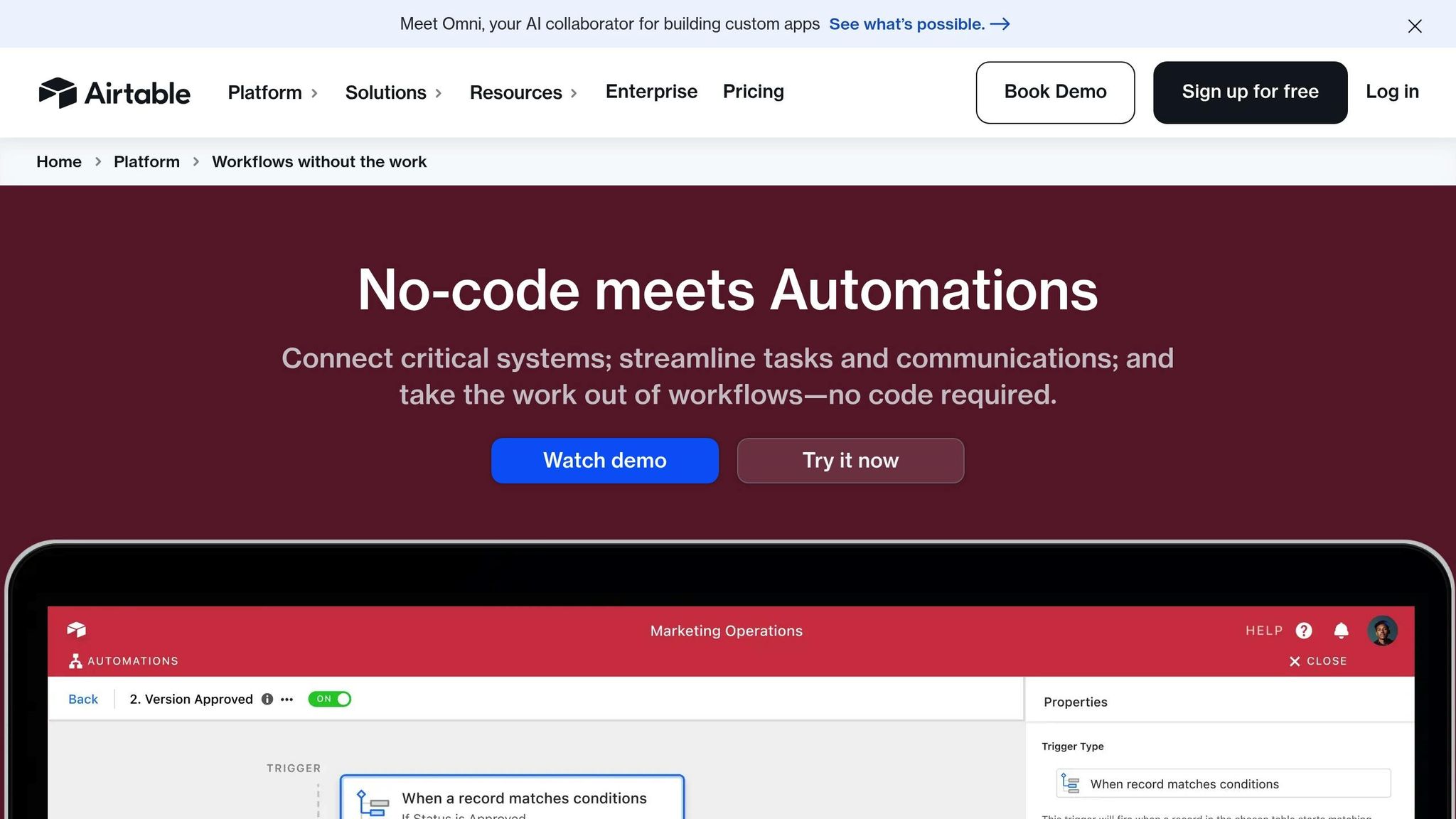
AI workflow systems are transforming how businesses operate by automating repetitive tasks, cutting costs, and boosting efficiency. Platforms like Prompts.ai, Zapier AI, and Airtable AI Automations each offer unique tools to streamline processes, improve productivity, and reduce operational complexity. Here's a quick breakdown:
Key takeaway: Choose the platform that aligns with your business needs - whether it's cost control, integration flexibility, or advanced AI orchestration.
| Platform | Key Features | Best For |
|---|---|---|
| Prompts.ai | Access 35+ AI models, token-based pricing, FinOps controls | Enterprises managing complex AI workflows |
| Zapier AI | App integrations, plain English commands | Small to medium workflows |
| Airtable AI | AI-powered database tools, trigger-based actions | Structured data management |
Each system addresses specific challenges, so evaluating your priorities - cost, scalability, or governance - is critical to finding the right fit.

Prompts.ai is designed as a robust AI orchestration platform for enterprises, addressing challenges like tool overload, hidden costs, and governance issues. Instead of requiring organizations to juggle multiple AI tools, it provides access to over 35 leading large language models through a single, secure interface.
One of the platform's key strengths is its ability to unify various AI models in one place. From OpenAI's GPT series to Anthropic's Claude and Google's Gemini, users can access these models without switching between interfaces or managing separate API keys. This eliminates the technical headaches often associated with multi-vendor AI setups.
The platform also supports side-by-side performance comparisons, enabling teams to test different models using identical prompts and datasets. This feature is especially beneficial for enterprises needing to fine-tune model selection for specific tasks, such as automating customer service, generating content, or analyzing data.
Beyond model access, Prompts.ai integrates seamlessly with existing enterprise workflows. Teams can embed AI capabilities directly into their current processes without requiring significant system changes or lengthy implementation timelines.
Prompts.ai addresses one of the most pressing challenges in enterprise AI: unpredictable and rising costs. The platform offers potential savings of up to 98% compared to maintaining multiple individual AI subscriptions.
The Pay-As-You-Go TOKN credit system eliminates the need for recurring subscription fees. Organizations only pay for the tokens they use, aligning costs with actual business value and avoiding the financial waste of underused subscriptions.
Real-time FinOps cost controls provide detailed tracking of AI usage. Finance teams can monitor spending down to individual prompts and users, making it easier to connect AI investments with tangible business outcomes. This level of transparency allows organizations to manage their budgets effectively and justify AI expenditures with clear ROI metrics.
The platform is built to scale quickly, enabling the addition of new models, users, and teams in minutes rather than months. This flexibility is essential for businesses with fluctuating AI demands or those rolling out AI initiatives across multiple departments.
With prompt workflow automation, teams can turn one-off experiments into repeatable, standardized processes. This ensures that AI workflows are consistent and scalable across the organization, reducing the chaos that often accompanies rapid AI adoption.
Whether serving small creative teams or large Fortune 500 companies, the platform adjusts resource allocation based on actual usage. Organizations can start small with pilot projects and expand their AI capabilities seamlessly, without running into technical or administrative hurdles.
Prompts.ai offers enterprise-level security and compliance features, addressing regulatory concerns that often hinder AI adoption in large organizations. Detailed audit trails are maintained for every AI interaction, providing the documentation needed for compliance and risk management.
The platform ensures that sensitive data remains secure during AI processing, alleviating privacy concerns that might otherwise deter enterprises from using cloud-based AI services.
Integrated usage controls allow administrators to enforce organizational policies, manage access, and monitor usage across teams and departments. Spending limits, model restrictions, and usage tracking ensure that AI deployment aligns with company policies and risk thresholds.
This comprehensive governance framework sets a high bar for AI orchestration, offering a clear benchmark for evaluating other platforms and their ability to address similar challenges.

While Prompts.ai focuses on unifying access to various large language models, Zapier AI shines in embedding AI into everyday business processes.
Zapier AI transforms automation by using AI to create workflows that understand context, make decisions, and adjust as needed.
Zapier AI works effortlessly with widely-used tools like Salesforce, HubSpot, Gmail, Slack, Microsoft Teams, and Google Workspace. This allows for intelligent workflows across platforms without requiring changes to your existing tech setup.
With its AI Actions feature, users can automate tasks like generating content, analyzing data, or categorizing customer emails - all through simple, plain English commands.
Zapier AI uses a task-based pricing model that scales with your business needs. By streamlining processes and reducing unnecessary steps, it enhances efficiency, especially for operations that handle large volumes of data.
The platform is designed to handle complex, multi-step workflows that span multiple departments. It also includes collaboration tools and automatically scales its capacity to handle peak workloads.
Zapier AI provides detailed audit logs and role-based access controls to ensure workflows are managed securely. It complies with strict data handling standards, offering features like encryption (both in transit and at rest) and data retention controls. These safeguards make it a reliable and secure option for businesses with evolving requirements.

Airtable AI Automations brings together the flexibility of spreadsheets and the power of artificial intelligence to streamline database management and project workflows. By integrating AI into its platform, it simplifies tasks like data categorization and content generation. Users can set up trigger-based automations to perform specific actions whenever predefined conditions are met, making it a versatile tool for managing workflows efficiently.
The platform is built to seamlessly connect with various business applications. With its API, users can create custom integrations, ensuring smooth data flow between systems and enabling real-time updates across platforms.
Airtable AI Automations operates on a per-seat pricing model, which helps reduce manual data entry and lowers administrative costs. By automating repetitive database tasks, teams can focus their energy on more strategic and impactful work.
Designed with growing organizations in mind, the platform can manage expanding databases with ease. Its architecture dynamically adjusts processing capacity to accommodate increased usage, making it a reliable choice for scaling businesses.
Security and control are key priorities for Airtable AI Automations. It offers customizable permission settings and robust security features, along with integrated backup and recovery options. These measures ensure data is protected and operations remain uninterrupted, even in the face of unexpected challenges.
AI workflow systems come with their own set of pros and cons. A clear understanding of these trade-offs can help businesses make informed decisions that align with their goals, budget, and technical needs. Below is a comparison of how different platforms address specific business priorities.
Scalability is a key factor, as businesses need to adapt quickly to changing demands. Each platform approaches growth and operational efficiency in its own way, offering unique benefits and limitations.
Prompts.ai stands out by optimizing costs and providing access to over 35 leading large language models. It eliminates recurring subscription fees and ensures enterprise-grade governance with real-time FinOps controls, making onboarding seamless and encouraging rapid adoption.
Zapier AI offers a user-friendly interface and broad app integrations, making it ideal for non-technical users managing simple automation tasks. However, it lacks the specialized orchestration and detailed cost controls required for more complex enterprise workflows.
Airtable AI Automations merges the ease of spreadsheets with automation capabilities. While it works well for structured data tasks, it may struggle with more advanced AI orchestration or highly customized needs.
Here’s a side-by-side comparison of key factors:
| Platform | Interoperability | Cost Efficiency | Scalability | Governance |
|---|---|---|---|---|
| Prompts.ai | Integration with 35+ AI models | Token-based pricing (up to 98% savings) | Enterprise-grade scaling | Real-time FinOps controls with audit trails |
| Zapier AI | App integrations | Tiered subscription pricing | Suitable for small to medium workflows | Essential security features |
| Airtable AI Automations | Supports API integrations and real-time sync | Subscription-based pricing | Adaptable for database-driven workflows | Customizable permissions and reliable backup |
The pricing models across these platforms differ significantly. Prompts.ai’s token-based system ties costs directly to usage, making it an appealing choice for organizations with fluctuating AI demands. Zapier AI’s subscription pricing ensures predictable expenses, while Airtable AI Automations is better suited for teams with consistent user counts. However, Airtable's pricing may become less favorable as needs expand.
Scalability is another area where these platforms diverge. Prompts.ai is designed for enterprise-level scaling, offering multiple model options and robust governance features. Zapier AI works well for straightforward integrations but may encounter challenges with complex, data-heavy workflows. Airtable AI Automations performs best in structured data environments but can face limitations when workflows extend beyond its database-centric design.
Governance and security are critical for enterprises. Prompts.ai leads with detailed audit trails, compliance features, and granular controls over AI model usage. Airtable AI Automations provides reliable governance through customizable permissions and data backup. Meanwhile, Zapier AI offers essential security features but lacks the depth of enterprise-level controls.
Each platform has strengths tailored to specific use cases, making it essential for businesses to weigh their priorities carefully when selecting a solution.
To wrap up, selecting the right AI workflow platform hinges on understanding your organization’s unique needs and priorities. Every system offers distinct advantages, so taking the time to evaluate options carefully is key to achieving long-term success.
If cost efficiency and scalability are top priorities, Prompts.ai is a standout choice. Its token-based pricing model can reduce expenses by up to 98% compared to conventional subscription plans, making it especially appealing for businesses with unpredictable AI usage. Additionally, for organizations requiring strict compliance, Prompts.ai provides enterprise-grade controls, including real-time FinOps monitoring and comprehensive audit trails.
A smart first step is to run pilot programs to test how well the platform integrates with your workflows. Opt for a solution that combines model selection with clear cost visibility and strong security measures. This strategy ensures that your investment in AI workflow automation not only meets operational goals but also delivers tangible results.
Prompts.ai takes the hassle out of managing intricate AI workflows by bringing multiple AI models together in one place, automating labor-intensive tasks, and delivering real-time insights to boost operational efficiency. These capabilities cut down on manual work and drive productivity.
Equipped with features like real-time monitoring, centralized model oversight, and risk management tools, Prompts.ai empowers businesses to simplify operations, automate repetitive processes, and improve team collaboration. This allows enterprises to scale their AI workflows effectively and achieve results that align with the unique demands of the U.S. market.
Prompts.ai's token-based pricing model is designed to help businesses save money by charging only for the tokens they actually use, rather than locking them into a flat subscription fee. This approach eliminates the risk of overpaying for unused capacity or expensive, one-size-fits-all plans.
With potential savings of up to 98% on AI-related costs, this model provides an efficient and flexible solution for businesses, whether they’re small startups or large enterprises. Paying only for what you use means you can better manage your budget while getting the most out of your AI-powered workflows.
Prompts.ai places a strong emphasis on safeguarding your data through enterprise-level security protocols. These measures include secure API management, real-time threat monitoring, detailed logging, and robust data leak prevention strategies.
Built with privacy and compliance at its core, the platform ensures the protection of sensitive information while meeting stringent privacy standards and governance policies. This commitment makes Prompts.ai a dependable solution for secure and compliant AI workflow management.


